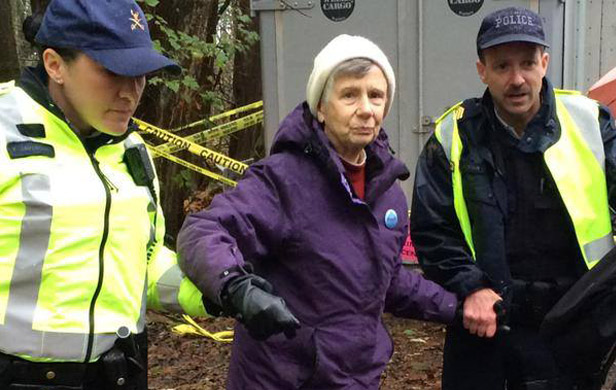
A scientist, or any knowledgeable person, will tell you climate change is a serious threat for Canada and the world. But the RCMP has a different take. A secret report by the national police force, obtained by Greenpeace, both minimizes the threat of global warming and conjures a spectre of threats posed by people who rightly call for sanity in dealing with problems caused by burning fossil fuels.
Anti-terrorism bill threatens free speech
The RCMP report has come to light as federal politicians debate the “anti-terrorism” Bill C-51. Although the act wouldn’t apply to “lawful advocacy, protest, dissent and artistic expression,” its language echoes the tone of the RCMP report. It would give massive new powers to the Canadian Security Intelligence Service to prevent any person or group from “undermining the security of Canada,” including “interference with critical infrastructure” and the “economic or financial stability of Canada.” And it would seriously infringe on freedom of speech and expression. The new CSIS powers would lack necessary public oversight.
The RCMP report specifically names Greenpeace, Tides Canada and the Sierra Club as part of “a growing, highly organized and well-financed anti-Canada petroleum movement that consists of peaceful activists, militants and violent extremists who are opposed to society’s reliance on fossil fuels.” The report downplays climate change, calling it a “perceived environmental threat” and saying members of the “international anti-Canadian petroleum movement … claim that climate change is now the most serious global environmental threat and that climate change is a direct consequence of elevated anthropogenic greenhouse gas emissions which, reportedly, are directly linked to the continued use of fossil fuels.” It also makes numerous references to anti-petroleum and indigenous “extremists”.
First Nations targeted
Language in the RCMP report and Bill C-51 leaves open the possibility that the act and increased police and CSIS powers could be used against First Nations and environmentalists engaging in non-violent protests against pipelines or other environmentally destructive projects.
As University of Ottawa law professor Craig Forcese points out, with its reference to “foreign-influenced activities within or relating to Canada that are detrimental to the interests of Canada,” the anti-terrorism law could be used in the case of a “foreign environmental foundation funding a Canadian environmental group’s secret efforts to plan a protest (done without proper permits) in opposition to the Keystone Pipeline Project.” Considering that government ministers have already characterized anti-pipeline protesters as “foreign-funded radicals”, that’s not a stretch. The RCMP could consider my strong support for greenhouse gas emissions reductions and renewable energy as “anti-petroleum”.
Who’s an “extremist”?
Combatting terrorism is important, but Canada is not at war, and we already have many laws — and enhanced police powers — to deal with terrorist threats. More importantly, the RCMP report fuels the legitimate fear that the new law could be used to curtail important civil liberties, affecting everyone from religious minorities to organized labour and First Nations to environmentalists.
If, for any reason, someone causes another person harm or damages infrastructure or property, that person should —and would, under current laws — face legal consequences. But the vast majority of people calling for rational discussion about fossil fuels and climate change — even those who engage in civil disobedience — aren’t “violent anti-petroleum extremists.” They’re people from all walks of life and ages who care about our country, our world, our families and friends and our future.
Core Canadian values in jeopardy
Canada is much more than a dirty energy “superpower”. Many people from different cultures and backgrounds and with varying political perspectives have built a nation that is the envy of the world. We have a spectacular natural environment, enlightened laws on issues ranging from equal rights to freedom of speech, robust social programs and a diverse, educated population. We mustn’t sacrifice all we have gained out of fear, or give up our hard-won civil liberties for a vague and overreaching law that, as Forcese and University of Toronto law professor Kent Roach point out, “undermines more promising avenues of addressing terrorism.”
Pollution and climate change caused by excessive burning of fossil fuels are real threats, not the people who warn that we must take these threats seriously. And while we must also respond to terrorism with the strong tools already in place, we have to remember that our rights and freedoms, not fear, are what keep us strong.
Written with contributions from David Suzuki Foundation Senior Editor Ian Hanington.


This Bill like any other “security” Bill may have been well intentioned but we live in the real world where police agencies have proven time and time again if you give them an inch they will take a mile.
Illegal, punative investigations leading to wrongful arrests eventually challenged by lawyers all the way to the Supreme Court of Canada. A huge waste of taxpayers money.
For example, Over the past 15 years I have noticed a trend by the RCMP in Saskatchewan to stop cars with BC license plates and question them. I first heard of it from sales friends who travel for business all over the western provinces and didnt believe it.
It’s happened to me twice when I have the rare reason to drive back east over a span of about 10 years.
A friend of mine last year( a 50 year old gal with boxes and plants in her Prius moving back to Ontario).
Her story,” When stopped I asked the officer why I was being stopped because I wasnt speeding…..”Routine traffic stop.” was the answer. After a few minutes of questions and the cop asking if he could “look in the trunk’ I was allowed to proceed. I have had less intrusive questioning when crossing the Canadian border……”
I had actually joked with my female friend before she left BC to “be ready for the dope check in Sask”. She laughed. Several days later she texted me , Just got pulled over! Unbelievable!”
Later I asked a cop friend what the deal is…..”They’re looking for dope.”
“Isnt that an illegal search and seizure if they find anything?” I asked
He shrugged and said , “Probably, but 99% of drug transporters wont challenge it in Court.”
So, next time you think of Bill C51 as just being for “terrorists’.
Think of a 50 year old librarian being pulled over in rural Saskatchewan on a cold snowy day in March in her Toyota Prius full of books and potted plants because “she fits the profile of a drug smuggler”…..
C51 …………..another loss of our freedoms.
One could argue that someone who is protesting pipelines, LNG, etc is trying to protect the long-term “economic or financial stability of Canada.”
Excellent point Hugh! A very logical and sensible view of the reality.
Absolutely Hugh – an excellent observation. I also wonder… are politicians and government administrations who are lobbied (directly, or indirectly, through campaign contributions) by fossil fuel industry and foreign interests to willfully refute consideration of scientific knowledge of the damaging effects of the burning of fossil fuels in their decision making …not …”acting against the interests of Canada” and protection of the Canadian people and their environment? Doesn’t that make them “foreign funded terrorists against the interests of Canadians”? With the outgrowth of growing dissent and protests by ordinary citizens, don’t the actions of these politicians and the government represent acts that are destabilizing Canadian society and the future sustainability of it’s natural capital infrastructure? Why are the government’s actions not being framed in media narrative as detrimental to the long term economic stability of Canada and the health of Canadians and our environment?
It should also be pointed out that society no longer has a “reliance on fossil fuels” – it has a reliance on reliable energy. That energy can now be sourced through an energy strategy mix of cleaner, renewable technologies.
This bill is anti-Canadian.